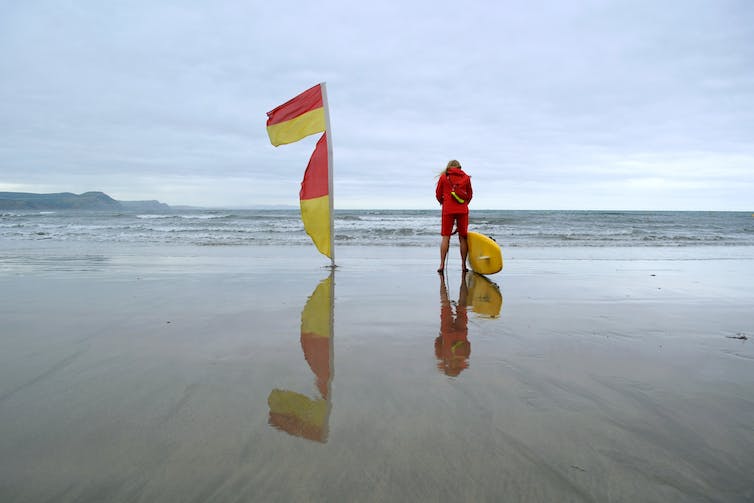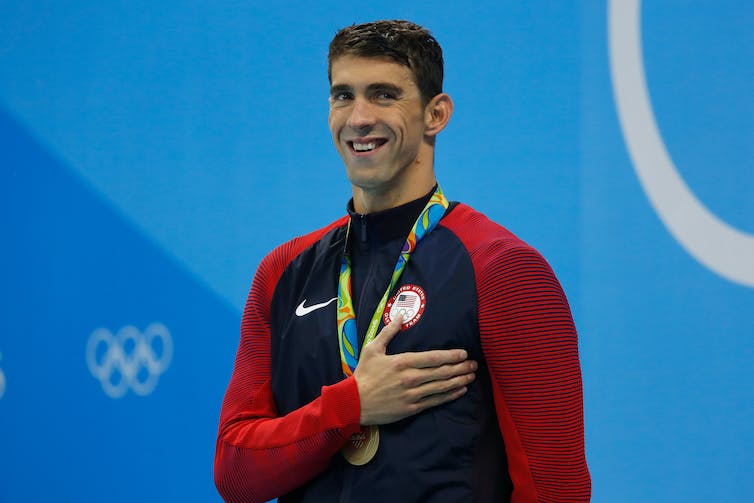YanLev/Shutterstock
Swimming is a novel exercise. Not solely is it an Olympic sport nevertheless it’s additionally a type of train and a life-saving endeavour. How many different bodily actions can boast such a declare?
So, it’s no shock that swimming holds such attraction within the UK, the place there’s a various vary of fanatics. We have Olympic champions, a world file holding nonagenarian, a brand new wave of chilly water dippers, aggressive swimmers and mum or dad and toddler teams who all love the water. For youngsters, swimming is each a sporting endeavour and a enjoyable leisure exercise that’s steadily related to scorching summer season holidays.
That’s what makes latest reviews into the dire state of youngsters’s swimming so regarding. Last summer season, a BBC report discovered that between 2019 and 2022, one in six native authorities within the UK had seen at the very least one swimming pool shut, on both a everlasting or non permanent foundation. Swim England, the nationwide governing physique for swimming, has estimated that round 1 in 4 youngsters go away main faculty unable to swim 25 metres. That quantity is anticipated to rise to as many as 6 in 10 by 2025.
The scenario is much more parlous in Wales. The chief govt of Swim Wales, Fergus Feaney, not too long ago targeted on some worrying statistics when he gave proof to the Senedd’s native authorities committee, as a part of its inquiry into council leisure companies.
Of explicit observe was that the price of swimming classes had virtually doubled from £6.50 earlier than COVID to a present common of £12.50. He additionally revealed that solely 50% of Welsh main colleges participate in swimming tuition programmes. Feaney left the enquiry with a regarding assertion:
We’re going to have a scenario very quickly, dare I say it, that white center class youngsters will be capable of swim and the remainder gained’t.
This raises questions on what the implications of a decline in entry to swimming for younger individuals could also be. Broadly talking, there’s the danger to life if youngsters are unable to swim but additionally an impression on bodily well being, psychological well being, and life expertise.
Drowning
Almost 20% of the England’s inhabitants reside in coastal areas. In Scotland, greater than 40% of individuals reside close to the coast, whereas in Wales, it’s greater than 60%.
Along with the rise in curiosity in open water swimming in lakes, rivers and the ocean, these mixed elements means there are security considerations concerning the discount within the variety of youngsters who aren’t competent within the water.
Many tutorial research have highlighted that swimming classes present vital safety towards drowning. Although, this may increasingly appear intuitive, youngsters’s lives are at elevated threat in our waters and overseas if the development in direction of decreased entry to swimming classes continues.

Almost 20% of the UK’s inhabitants reside in coastal areas in accordance with the Office for National Statistics.
Savo Ilic/Shutterstock
It is now well-known that bodily exercise has a constructive impression on bodily well being and might defend towards sickness and poor well being. Engagement in bodily exercise at a younger age can have a big impression on not solely a toddler’s bodily well being but additionally on their well being as they transfer into adolescence and maturity.
An necessary difficulty raised by Swim Wales’ Feaney was the discount in entry for younger individuals in disadvantaged areas. These people are already at a excessive threat of weight problems. So, eradicating entry to swimming classes takes away not only a enjoyable exercise however a protecting issue towards early weight problems.
Swimming can be a low-impact exercise that places minimal stress on the joints and muscle mass, making it an excellent type of train for kids who could also be susceptible to damage or who’ve restricted mobility. At the identical time, it’s additionally a full-body exercise that engages the entire main muscle teams and encourages the event of elementary motion expertise.
Mental well being
Beyond the simple impression on bodily well being, swimming has constructive impacts on psychological well being and basic wellbeing. Swimming has been proven to enhance depressive signs, cut back nervousness, and defend towards psychological ailing well being.
Michael Phelps, arguably the best swimmer of all time, has spoken at size about how swimming enabled him to deal with his ADHD.

American swimmer Michael Phelps gained 23 Olympic gold medals throughout his profession.
Salty View/Shutterstock
However, psychological wellbeing is about greater than the absence of poor psychological well being. Swimming will help keep vanity and improve confidence. It additionally facilitates the event of a progress mindset, which is the assumption you can develop your expertise by arduous work.
Swimming from a really younger age in mum or dad and child classes even has the potential to affect cognitive and motor improvement in infants.
Engagement in aggressive swimming offers younger individuals with transferable expertise round self-discipline, time administration, social interplay, teamwork and choice making. And whether or not for leisure or aggressive functions, swimming has the potential to be a lifelong exercise, offering us with a few of the very constructing blocks we have to keep a contented and wholesome life-style.
The UK’s swimming governing our bodies have now united underneath a marketing campaign, which goals to “save our swimming pools”. Indeed, swimming ought to be considered as important for the well being of the nation for years to come back, and due to this fact must be protected.
![]()
Karen Howells doesn’t work for, seek the advice of, personal shares in or obtain funding from any firm or group that might profit from this text, and has disclosed no related affiliations past their tutorial appointment.
